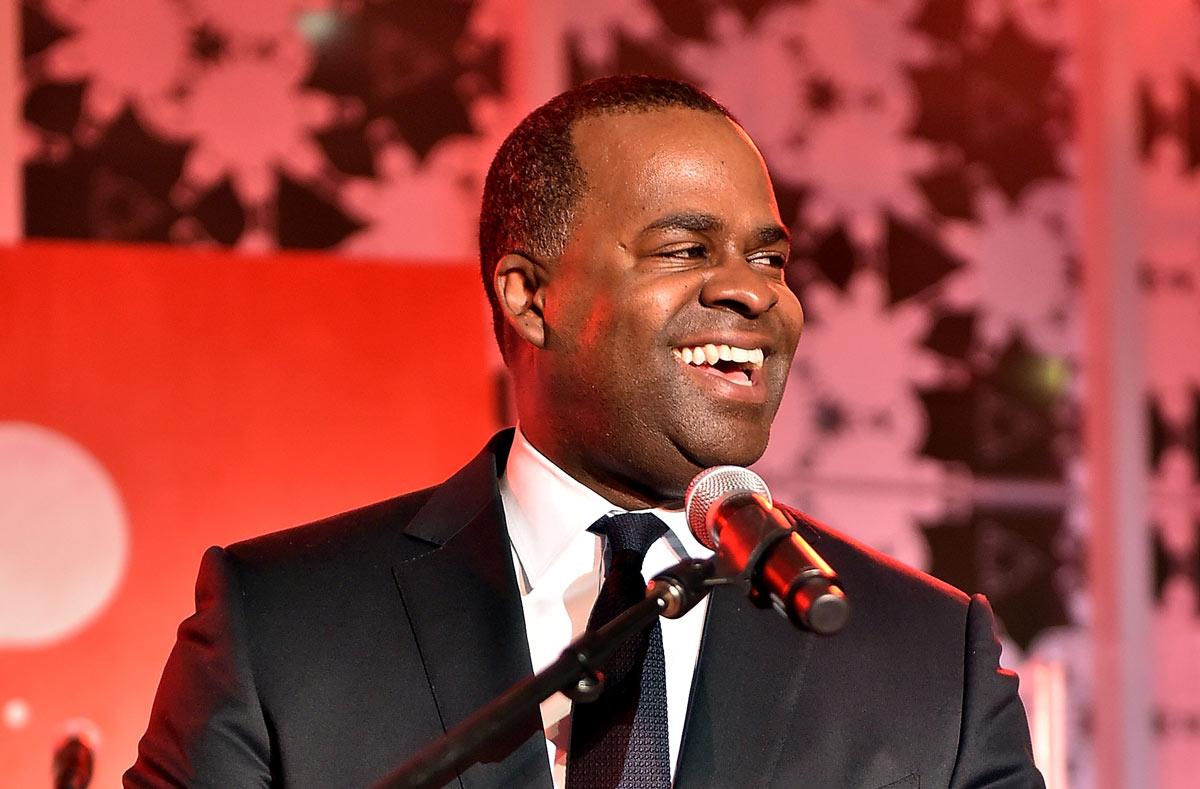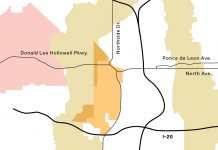
Photograph by Paras Griffin/Getty Images
Four years ago, Kasim Reed said goodbye to the job he’d wanted since he was 13 years old: being the mayor of Atlanta. This November, the cutthroat politician who used raw power and the bully pulpit to lead the city out of the Great Recession and into its most recent boom, will try to win his dream job back.
On Monday Reed filed paperwork to launch his bid for a third term as Atlanta mayor and intends to officially announce his decision during his 52nd birthday party on Thursday, according to two sources with direct knowledge of his campaign plans. By doing so, Reed immediately becomes a formidable candidate in a packed race to lead the city.
On Saturday, prominent Democrats, local business leaders, and other allies started receiving invitations to Reed’s party. The event’s address would be provided upon RSVP, the invite said, and though it did not explicitly bill the event—which is “PAID FOR BY KASIM REED FOR ATLANTA, INC.”—as a campaign kick-off, the details were quite clear: Guests would have to pay at least $1,000 to attend and contributions can’t exceed $4,300, the statutory limit for municipal campaigns. [Editor’s note 6/11/21: Reed did indeed announce his mayoral bid during this party, which was held at actor Tyrese Gibson’s mansion in Buckhead.]
Reed (who declined to comment for this story) joins a ballot that includes: Atlanta City Council President Felicia Moore and Councilman Andre Dickens, both of whom served during Reed’s mayoral terms; Antonio Brown, the first-term city councilman who says Reed encouraged his bid; and Sharon Gay, a Dentons attorney with strong ties to the city’s legal and business community and onetime deputy chief of staff to former mayor Bill Campbell. Qualifying ends in August, and other people are said to be considering runs, including Tharon Johnson, a veteran Democratic strategist and businessman.
On the agenda between now and November are questions about how Atlanta will recover from the pandemic, chip away at systemic and sharp income inequality, and, like many other cities, turn around a sharp increase in crime. In addition, the next mayor will have to thwart ongoing efforts by state lawmakers to take over Hartsfield-Jackson International Airport and address anger over public safety in Buckhead, which is threatening to secede and take nearly half of the city’s tax revenue with it. On top of that is the complex business of running a growing city with a roughly $700 million budget and thousands of employees.
Reed will be quick to point to his on-the-job experience, including in public safety; Reed won the 2009 election with a campaign promise of beefing up the Atlanta Police Department’s ranks to 2,000 officers and overhauling the force’s top brass. However, he will also open himself to questions about his two terms as mayor, from whether he did enough to offset displacement caused by the city’s development boom to how he missed a City Hall bribery scandal that erupted in 2015 and ensnared his former procurement chief, a top adviser, and city contractors. Reed, who is the first Atlanta mayor to seek a third term since Maynard Jackson successfully ran in 1991, has not been accused of any wrongdoing.
In an interview with WSB-TV last month, Reed apologized for the corruption scandal and said history would not repeat itself if he became mayor again. Federal prosecutors working under then President Barack Obama and his successor, Donald Trump, “looked into every aspect of my life for more than three years and took no action.”
After Trump’s victory in 2016, Reed’s potential path to a White House cabinet position under Hillary Clinton vanished, and in the years since leaving City Hall, he’s worked in venture capital, backing startups like Jetdoc and serving as an adviser to popular restaurant companies including Slutty Vegan. When Mayor Keisha Lance Bottoms, Reed’s hand-picked candidate in 2017, stunned allies and political observers and announced she would not seek a second term, speculation that Reed would jump into the contest became more credible.
A charismatic and combative figure, Reed’s time in office focused on shoring up the city’s finances by reforming the employee pension system, selling off public land, and positioning the city to capitalize on a return to intown living. A boxing fan, Reed along the way often sparred with local journalists, politicians, and others who dared cross him.
Overcoming the perception of being asleep at the wheel during a corruption scandal could be too much of a political mountain for Reed to climb, says William Perry of Georgia Ethics Watchdogs, who jousted with Reed about public funding to help build Mercedes-Benz Stadium and the airport’s lucrative contracting system. That perception, Perry says, could make fundraising more difficult and discourage some political, civic, and business leaders from publicly backing him.
Name recognition is quite an advantage, however, and Reed—a former state representative, state senator, and mayor—has more than anyone else in the race, says Andra Gillespie, an Emory University political science associate professor. In addition, she says, Reed can point to his record on reducing crime at a time when many Atlantans are “clamoring for increased public safety”—as well as his past success at putting Atlanta on a bigger stage by boosting tech, music, and film industries, and drawing large events like the Super Bowl. Also working in his favor: Reed’s focus on improving the relationship between the city and state, which under his predecessor Shirley Franklin had dwindled to nonexistent.
Times are different. Reed brokered a peace deal with then Governor Nathan Deal, says Harvey Newman, a professor emeritus of the Andrew Young School for Policy Studies at Georgia State University; politics weren’t nearly as polarized, divisive, and caustic as they are today. Governor Brian Kemp and Mayor Bottoms have quarreled over Black Lives Matter protests, street racing, and even Covid-19 mask ordinances. The approaches to improving public safety in the early 2010s won’t necessarily apply during an era when police-citizen relations have been fractured by the high-profile police shootings of Black Americans, including George Floyd, Breonna Taylor, and Rayshard Brooks. “Just because you did it 12 years ago when you got elected doesn’t mean you can do it now,” Newman says.
Ultimately, Gillespie says, “This race is a test of Kasim Reed’s staying power and his potential for a comeback.”








![The North Carolina Museum of Natural Sciences’ newest exhibit is a [pre]historic first](https://cdn2.atlantamagazine.com/wp-content/uploads/sites/4/2024/04/DD-3-100x70.jpg)




